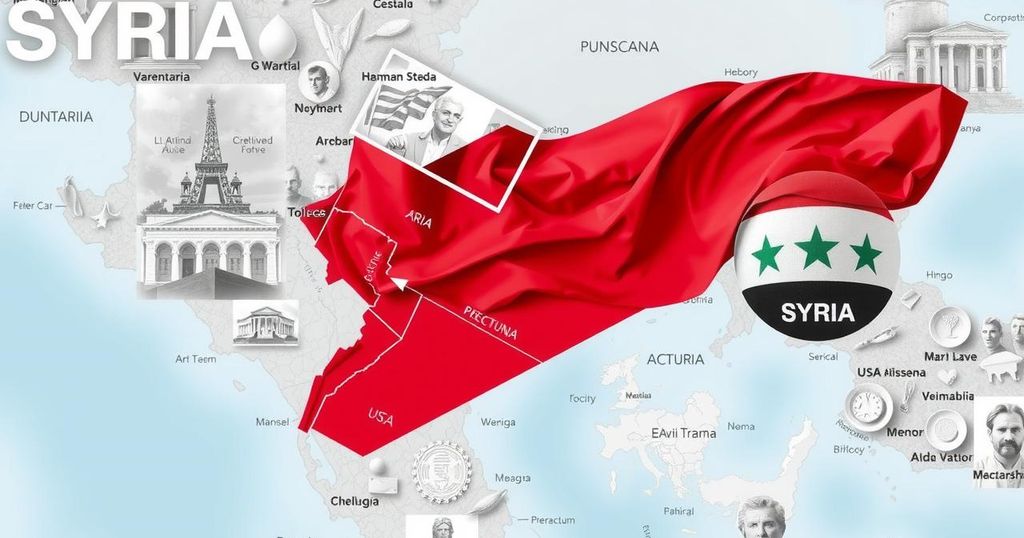Geopolitical Ramifications of Assad’s Ouster: The Rise of Khalifa Haftar in Libya
The fall of Syrian President Bashar al-Assad has triggered a geopolitical shift, with Russia redirecting its military focus towards Libya to support Khalifa Haftar. Increased air and naval activity link Syria and Libya, highlighting Moscow’s strategic interests in securing presence in the Mediterranean. Despite allegations of Haftar’s illicit connections with the Assad regime, Western powers continue engaging with him, questioning their efficacy in curbing Russian influence in the region.
The recent ousting of Syrian President Bashar al-Assad has initiated a ripple effect across the Mediterranean, particularly influencing the dynamics in Libya. As Russia experiences a military withdrawal from Syria, it is shifting its focus towards Libya, where it appears to strengthen the position of Libyan leader Khalifa Haftar. Following Assad’s departure, reports indicated that several Assad loyalists swiftly arrived in Benghazi, Libya, highlighting the immediate connections being formed amidst the political upheaval.
In the face of these developments, air traffic between Syria and Libya surged, suggesting a strategic movement by Russia to reallocate military resources. The Kremlin, acknowledging the rapid changes in Syria, has been seen to engage with various factions, emphasizing its interest in maintaining influence in the region. Notably, naval assets are also being transitioned from Syria’s Tartus port to Libya, amplifying Western concerns regarding Russian naval ambitions in the eastern Mediterranean, particularly as Haftar’s forces control significant coastal territory.
Historically, the Tartus naval facility has been a cornerstone of Russian military operations in the Mediterranean, with a long-term lease agreement solidifying its strategic importance. The Conservative geopolitical landscape following Assad’s fall has emboldened Haftar, transforming him into a pivotal player in Russian interests in Libya, as evidenced by commentary from analysts who note the shift in dependency towards Libya for Russia.
Khalifa Haftar’s formidable presence has been substantiated by connections to the Assad regime, with both regimes sharing common ideologies and frameworks that facilitate illicit business networks. Reports detailing the extensive trafficking operations linking the two leaders suggest a deep-rooted collaboration extending well beyond mere political support. Although Haftar’s dealings with Russia have been acknowledged, there remains a larger narrative concerning Western policy’s failure to mitigate the influence of Russian involvement in Libya.
Despite the incriminating reports surrounding Haftar’s affiliations with illicit activities, U.S. and European strategies seem to overlook these concerns, instead focusing on negotiating a balance of power between rival factions in Libya. The interactions between Turkey and Russia in Libya also add a layer of complexity, as both nations jockey for influence while maintaining a degree of cooperation amidst their respective interests in the region’s hydrocarbon resources.
The developments of late 2023 depict a landscape where Russia’s military realignment towards Libya could exacerbate tensions in other conflict-ridden areas. Analysts express caution, suggesting that increased Russian presence in Libya may lead to escalated conflicts in surrounding regions. As the geopolitical picture evolves with the changing fortunes of Assad and Haftar, the international community remains watchful of the potential ramifications for North Africa and beyond.
The geopolitical scenario in the Mediterranean has drastically shifted following the ouster of Syrian President Bashar al-Assad, causing attention to pivot towards Libya, where Russia is seen increasing its influence. The context is one of military strategy, regional power dynamics, and the long-standing complexities of international relations affecting Libya, especially in light of its past conflicts and foreign interventions. Additionally, Khalifa Haftar, who controls significant portions of Libya, appears poised to leverage the recent shifts to strengthen his position. The nexus of Libya as a strategic entry point for Russian interests in Africa further complicates matters, given the ongoing relationship between Haftar and the Assad regime.
The ousting of Bashar al-Assad marks a pivotal moment for geopolitics in the Mediterranean, fundamentally altering the power landscape in Libya as Russia aims to consolidate its relationships and military presence in the region. The connections between Haftar and Assad illustrate a broader pattern of authoritarian governance supported by illicit networks. As foreign powers maneuver to exert influence, the West’s seemingly passive stance raises questions about future stability and security in Libya and the wider Mediterranean area, particularly in light of historical patterns of conflict and cooperation between local and international actors.
Original Source: www.france24.com




Post Comment